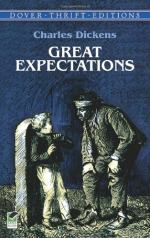“There, again!” said I, stopping before Herbert, with my open hands held out, as if they contained the desperation of the case. “I know nothing of his life. It has almost made me mad to sit here of a night and see him before me, so bound up with my fortunes and misfortunes, and yet so unknown to me, except as the miserable wretch who terrified me two days in my childhood!”
Herbert got up, and linked his arm in mine, and we slowly walked to and fro together, studying the carpet.
“Handel,” said Herbert, stopping, “you feel convinced that you can take no further benefits from him; do you?”
“Fully. Surely you would, too, if you were in my place?”
“And you feel convinced that you must break with him?”
“Herbert, can you ask me?”
“And you have, and are bound to have, that tenderness for the life he has risked on your account, that you must save him, if possible, from throwing it away. Then you must get him out of England before you stir a finger to extricate yourself. That done, extricate yourself, in Heaven’s name, and we’ll see it out together, dear old boy.”
It was a comfort to shake hands upon it, and walk up and down again, with only that done.
“Now, Herbert,” said I, “with reference to gaining some knowledge of his history. There is but one way that I know of. I must ask him point-blank.”
“Yes. Ask him,” said Herbert, “when we sit at breakfast in the morning.” For, he had said, on taking leave of Herbert, that he would come to breakfast with us.
With this project formed, we went to bed. I had the wildest dreams concerning him, and woke unrefreshed; I woke, too, to recover the fear which I had lost in the night, of his being found out as a returned transport. Waking, I never lost that fear.
He came round at the appointed time, took out his jack-knife, and sat down to his meal. He was full of plans “for his gentleman’s coming out strong, and like a gentleman,” and urged me to begin speedily upon the pocket-book, which he had left in my possession. He considered the chambers and his own lodging as temporary residences, and advised me to look out at once for a “fashionable crib” near Hyde Park, in which he could have “a shake-down”. When he had made an end of his breakfast, and was wiping his knife on his leg, I said to him, without a word of preface:
“After you were gone last night, I told my friend of the struggle that the soldiers found you engaged in on the marshes, when we came up. You remember?”
“Remember!” said he. “I think so!”
“We want to know something about that man — and about you. It is strange to know no more about either, and particularly you, than I was able to tell last night. Is not this as good a time as another for our knowing more?”
“Well!” he said, after consideration. “You’re on your oath, you know, Pip’s comrade?”




